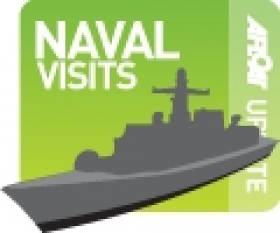Displaying items by tag: USS John F Kennedy
#USS NAVY VISIT - The United States Navy landing-ship USS Fort McHenry (LSD-43) is to make a courtesy call to Dublin Port tomorrow, and remain for the next 11 days, so to include American Football Week, writes Jehan Ashmore.
She is scheduled to dock at Ocean Pier, berth 33, where the vessel will be available for public tours organised through a lottery held next weekend (1-2 September). To register for the tours, follow this visit: http://dublin.usembassy.gov/uss-fort-mchenry.html
To see more information about USS Fort McHenry, www.fort-mchenry.navy.mil/
The United States Naval Academy will host the University of Notre Dame this September 1st in their annual NCAA fixture. For only the second time since this great fixture started in 1927, the game will be played outside the United States, with Ireland's Aviva Stadium staging the match.
The response from the Irish and American public has been exceptional with tickets selling out almost six months ahead of the game. Over 30,000 US patrons will travel to Dublin for this game, making it one the biggest international sporting events to be staged in Ireland in 2012.
For a list of events around the game click HERE.
The visit of USS Fort McHenry, is similar to that of the aircraft carrier, USS John F. Kennedy (CV-67) which anchored off Dun Laoghaire Harbour in 1996, again on that occasion, a lottery was held for the public during the visit of the 82,000 tonnes giant. Her call to Dublin Bay was during Jean Kennedy-Smith's tenure as US Ambassador to Ireland, and during the early days of the northern 'peace process'.
Returning to the present, the Irish Naval Service 'flagship' OPV L.É. Eithne (P31) arrived into the port today, albeit her call is of a typical short duration, where the 1,800 tonnes vessel will only make an overnight stay.
Notably she is the first and only Naval Service vessel to visit the US, when she visited Boston, Hamilton and New York in 1986. In addition the helicopter patrol vessel is the last naval vessel built in this state for the Naval Service and also is the last ever ship built in the the republic, when completed by Verolme Cork Dockyard in 1984.
It is ironic that the L.E. Eithne should visit the United States before making any call to Northern Ireland, which did not materilise until a historic first visit was made to Belfast Harbour in 2003. Her visit to the north was the first since partition in 1922 and the OPV docked in the port to where HMS Tyne was also berthed.
























































